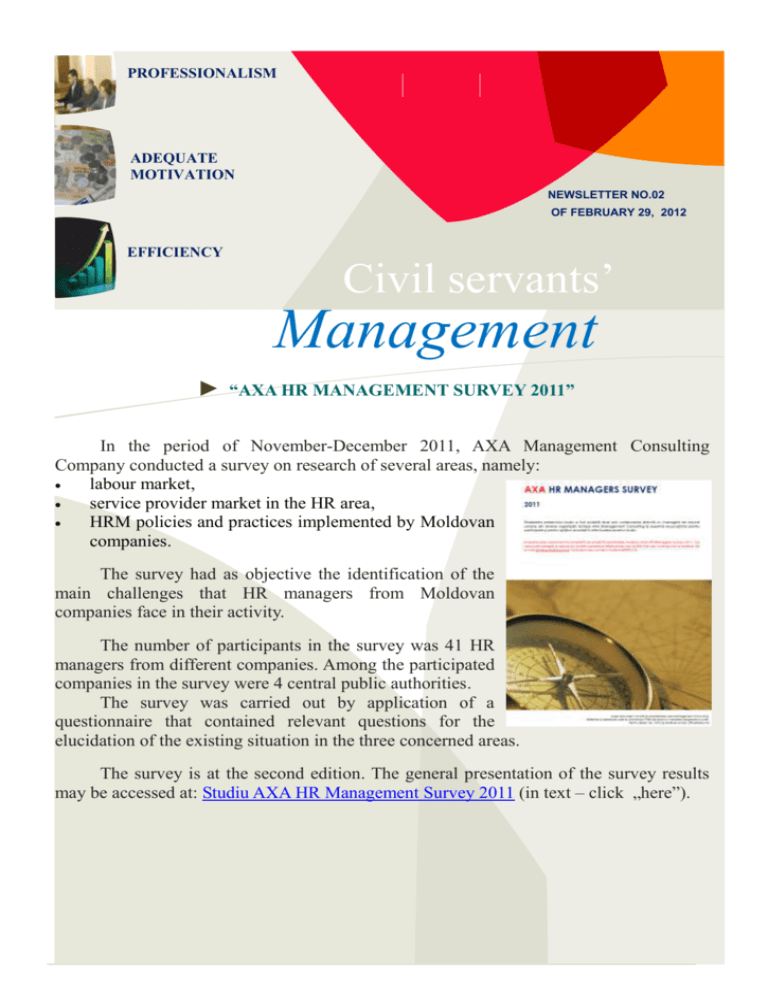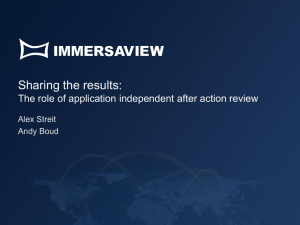Newsletter "Civil Servants` Management" nr. 2
advertisement

PROFESSIONALISM ADEQUATE MOTIVATION NEWSLETTER NO.02 OF FEBRUARY 29, 2012 EFFICIENCY Civil servants’ Management ► “AXA HR MANAGEMENT SURVEY 2011” In the period of November-December 2011, AXA Management Consulting Company conducted a survey on research of several areas, namely: labour market, service provider market in the HR area, HRM policies and practices implemented by Moldovan companies. The survey had as objective the identification of the main challenges that HR managers from Moldovan companies face in their activity. The number of participants in the survey was 41 HR managers from different companies. Among the participated companies in the survey were 4 central public authorities. The survey was carried out by application of a questionnaire that contained relevant questions for the elucidation of the existing situation in the three concerned areas. The survey is at the second edition. The general presentation of the survey results may be accessed at: Studiu AXA HR Management Survey 2011 (in text – click „here”). ► NEW INSTRUMENTS OF PROMOTION OF VACANT POSITIONS AND ATTRACTION OF TALENTS The public authorities may benefit of a new possibility to promote vacant positions and to attract competitive candidates. This is possible through a new job web portal that offers a modern platform of mediation of services in this area. Such electronic system is a wish of those who visited the panel of the State Chancellery within the Job Fair. The State Chancellery is welcomed at the Job Fair In the period of January 31 – February 3, the State Chancellery presented at the Job Fair over 300 vacant positions, announced by 33 public authorities. The event was organized within the National Exposition “Made in Moldova”, which took place at the International Exhibition Centre “MOLDEXPO” S.A. The general information was made available to the interested public, containing the name of the entity and the unit that has vacant position, the title and category of the position, contact data, as well as leaflets regarding the ways of employing in civil service. The details on every position could be found on the web pages of the respective entities. The majority of those interested in professional opportunities were young persons. The representatives of the State Chancellery benefited of this opportunity to promote the possibility of a career in civil service and to explain the advantages of a career path in public authorities. The State Chancellery staff carried out an ad-hoc survey to research the utility of such actions and to request suggestions on service improvement. As a result, the recommendations of those interviewed were focused on three key messages. These refer to the necessity of: an electronic system that should contain, in a centralized way, the information about all vacant positions in the public authorities and which should include on-line interactive options between employer and those searching for a job; widely informing the public about the existing positions; openness from the part of authorities who recruit and implementation of the legislation on the selection process of candidates. Please see several suggestions of those interviewed: Elena: I am very glad that it is structured information about vacant positions. I returned from abroad and I have decided to start a career in civil service. I didn’t hear about this fair, my mother told me that the Government has a panel here and I came to familiarise myself. We would like to have more information about all professional opportunities. Aliona: I think that this information is useful, but, however, I would like to be created an on-line system that should contain all information about vacant positions in one place. This refers to the possibility to post CV on site or to receive notifications on new vacant positions. Irina: I would like to try a career in civil service. Till now I have worked in private sector and I understood that this is not for me. Valeriu: I hope that somebody will ask to phones indicated for every position. My wish is that public organizations should truly respect the transparency in the recruitment process. A new job web-portal “Angajat.md” – a new platform for public authorities to recruit talents The first step towards on-line presence of employers from public authorities should be the new job web-portal “Angajat.md”, that is a modern platform of mediation of labour market services. This system is a good opportunity of interaction between employers and those searching for a job. Such on-line instruments proved to be an efficient instrument in the process of searching professionals in many countries and organizations. On February 3, the National Agency for Employment (NAE), which is the initiator of this program, held a seminar at the IEC “MOLDEXPO” S.A., within which it informed the potential employers about the opportunities offered by new portal “Angajat.md”. Thus, persons who are searching for a job may post CV and access the announced vacant positions. The organizations that are searching for employees, may register in the system, post vacant positions and view the available CVs. In order to facilitate the search of useful information, the portal makes available a new instrument, called correlation. It has the function to search for CVs that meet the employer’s requirements, as well as to find out the vacant positions according to the profile of person searching a job. Maria Bulgaru, deputy head of the IT and Communication Division within the NAE, noted that this system is in compliance with the most advanced practices of mediation of labour market services. The idea of this project is to provide public access to the vacant positions date base, thus, eliminating the bureaucratic element in providing the respective services. This electronic system is an optimal solution for public authorities, which would like to attract more competitive candidates in the recruitment process. The HR units within these institutions are encouraged to register in the system, to create its on-line profile and to use the offered instruments. Certainly, to benefit of the facilities of this program, a commitment and a systematic effort are needed. Nevertheless, what is requested firstly, is the wish to explore new ways of management of this process and a positive attitude towards change. HR specialists may become the vanguard of establishment of a new open culture of promotion of the meritocracy principle in civil service. Methodological assistance to the public authorities SEVERAL AMENDMENTS WERE INTRODUCED TO THE CHAPTER OF CIVIL SERVANTS’ INCOMPATIBILITIES As we noted in the previously edition of “Civil servants’ management” newsletter (http://rapc.gov.md/file/BI-MFP-01-2012_f.doc), on March 1, 2012 come into force the Law no. 180 of December 19, 2011 on the National Commission on Integrity and the Law no.181 of December 19, 2011 on amendments of some legislative acts. In accordance with the provisions of the art. XXII of the Law no.181 of December 19, 2011, several amendments were introduced to the Law no.158-XVI of July 4, 2008 on public office and status of civil servant (hereinafter – the Law no.158-XVI). Among them are: 1. exposing in a new version the art.25 item (6); 2. exclusion from the disciplinary misbehaviour list (art.57) of the infringement of provisions on incompatibilities; 3. extension of the prescriptive term for disciplinary sanctioning of violation of the legislation on property and income declaration and on interest conflict; 4. filling the list of public authorities, which fall under the Law no.158-XVI, point „the National Commission on Integrity”. Further, we will analyse the first 2 mentioned modifications, especially by determining the differences of approach between the new regulations in relation to those in force at present. 1. Exposing in a new version the art.25 item (6) According to the current version of the art.25 item (6) of the Law no.158-XVI, the civil servant involved in one of the incompatible activities is warned in writing by the head of the public authority to abandon his/her activity, and if, upon the expiration of one month from the date of receiving the warning, the civil servant does not abandon his/her activity, the latter shall be dismissed from the respective position. At the same time, the new version of the art.25 item (6) of the Law no.158-XVI sets that the incompatibility situation shall terminate during the month from the day of its appearance, and if the civil servant did not eliminate the incompatibility situation in the envisaged term, the latter is dismissed from the respective position. (i) The first difference between the current regulation and the new one refers to the moment from which starts to run the term of a month, set to civil servant for termination of the incompatibility situation. If according to the current version of the law, it starts to run from the day of warning in writing the civil servant by the head of the public authority, then, according to the new version, the respective term starts to run even from the moment of appearance of incompatibility. In fact, the civil servant is offered a month from the moment of appearance of incompatibility for its liquidation, without imposing some formal conditions. Following the above-mentioned, it may lead to another conclusion: according to the current version of the law, the civil servant may be in the incompatibility situation, without existing the possibility of dismissal from the position, more than one month from the day of appearance of incompatibility, because to dismiss the respective civil servant shall be consecutively performed more actions, which cumulative duration may exceed one month (for example, revealing the incompatibility by the head – that can be carried out later than the appearance of incompatibility, issuing of warning in writing, not undertaking the actions to terminate the incompatibility after the expiration of a month from the date of receiving the warning), but, according to new regulations, the possibility of civil servant to be in the incompatibility situation without existing the possibility of dismissal from the position reduces to one month, this is a limited term, within which the civil servant is obliged to terminate the situation in which he/she is, otherwise he/she will be dismissed from the public function. (ii) Another aspect that distinguishes the new version in relation to the actual one refers to the competent subject in revealing, ascertaining and liquidation of incompatibilities among the civil servants. If the current text of the law denotes, though indirectly, that the head of public authority is the person which shall undertake all actions in order to reveal and to liquidate the incompatibilities of subordinated civil servants, the new version of the law does not expressly contain such regulation. At the same time, taking in account that the Law no.181 of December 19, 2011 is subsequent to the Law no.180 of December 19, 2011, the latter is the one that regulates the new institutional and functional framework in this area. According to the item 4 point d) of the Regulation on the National Commission on Integrity, approved through Law no.180 of December 19, 2011, one of the duties of the National Commission on Integrity (hereinafter – NCI) is the ascertainment of nonrespecting the legal provisions on the civil servants’ incompatibility, notifying the competent bodies in order to terminate their service relations. At the same time, according to the items 52-55 of the above-mentioned regulation, if the NCI ascertains that civil servant was or is in the incompatibility situation, it passes an ascertaining act that permanently remains either after the expiration of 15 days from the day of notifying (in case if it was not disputed), or on the day of issuing irrevocable court decision, as a result of examining the dispute. Thus, pursuant to new legal regulations, the NCI is the body in charge of revealing and ascertaining the incompatibilities among civil servants. Moreover, after permanently remaining of the ascertaining act, NCI is obliged to notify the head of the public authority, and the latter shall dispose the dismissal of the civil servant. It should be noted that unlike the actions of the heads of public authorities, which have, in the first phase, a “prevention” nature (given that at the beginning the civil servant is warned), the NCI’s interventions are in all cases of nature to sanction the civil servants who violated the provisions on incompatibilities. 2. Exclusion from the disciplinary misbehaviour list (art.57) of violation of the provisions on incompatibilities In accordance with the current provisions of the Law no.158-XVI (art.25, art.57 item j), art.64 item c)), violation by the civil servant of provisions on incompatibilities is both disciplinary misbehaviour and the ground for dismissal from the position. The incompatibility was excluded from the disciplinary misbehaviour list through the amendments introduced through art. XXII of the Law no.181 of December 19, 2011. Consequently, the civil servant being in the incompatibility situation till one month represents a lawful action, for which no sanction can be applied, but if the incompatibility of the respective civil servant lasts more than one month – he/she will be dismissed from the position by the head of the public authority, as a result of familiarizing with the ascertaining act of NCI. Sergiu Litvinenco, Local consultant, PPD Policy Personnel Division within the State Chancellery Tel.: (0 22) 250 137; e-mail: dpc@gov.md www.rapc.gov.md









